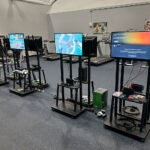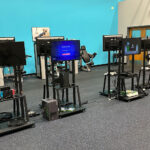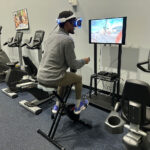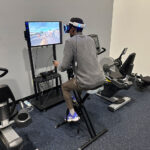The mission of the Physical Activity Epidemiology Laboratory is to improve the health of Americans through empirical research, increasing public awareness, and policy advocacy on issues in relation to physical activity intervention, physical activity correlates, physical health, and obesity.
The mission will be achieved through:
- Conducting empirical research on the effects of innovative physical activity interventions on individuals’ health behaviors
- Assessing physical activity, physical fitness, movement skills, physical activity correlates, and body composition in the laboratory and field settings
- Quantifying the impact of physical activity, sedentary behavior, and obesity on individuals’ health
- Studying correlates of physical activity and sedentary behavior among various populations
- Examining the dynamic relationships between children’s physical activity, physical activity correlates, health-related physical fitness, and obesity
- Establishing an innovative physical activity intervention site using active video games
- Investigating the potential of active video games as a solution of promoting children’s physical activity participation and physical fitness, enhancing movement skills, fostering cognitive and social development, as well as reducing childhood obesity
- Training highly qualified graduate students in the area of physical activity epidemiology to expand the research capacity in this area
Recently, Gao et al. presented a research abstract titled “Effects of Personalized Exercise Prescriptions and Social Media through m-Health on Cancer Survivors’ Physical Activity and Quality of Life” for presentation at the 2023 ACSM annual meeting. The following are the highlights of the project:
- The multi-component m-health intervention (personalized exercise prescriptions and social media) significantly increased cancer survivors’ daily steps than the control condition adopting usual practice post-intervention.
- The multi-component m-health intervention led to greater increases in physical health than the control condition.
- The social media intervention had greater increased social support than the control condition post-intervention.
- The multi-component m-health intervention also had greater increased physical health than the social media intervention.
Purpose: To examine the effects of a multi-component m-health intervention (wearable, apps and social media) on cancer survivors’ physical activity (PA), quality of life, and PA determinants, compared to exercise prescription only, social media only, and attention control conditions.
Methods: A total of 126 cancer survivors (X̅ age = 60.37 ± 7.41 years) were recruited from within the U.S. The study duration was 6-months. The participants were randomly placed into 4 groups. All participant received a Fitbit tracker and were instructed to install its companion app to monitor their daily PA. They 1) received previously established weekly personalized exercise prescriptions via emails, 2) received weekly Facebook health education and interacted with one another, 3) received both conditions 1 and 2, and 4) were part of the control condition: adopted usual care. Cancer survivors’ PA daily steps, quality of life (i.e., physical health and mental health), and PA determinants (e.g., self-efficacy, social support) were measured at baseline, 3 months, and 6 months.
Results: The final sample size included 123 cancer survivors. The results revealed only the multi-component condition had greater improvements in PA daily steps than the control condition post-intervention (p < 0.05; 95%CI: 368 to 2,951). Similarly, those in the multi-component condition had significantly greater increased physical health than the control condition (p < 0.05; 95%CI: -0.41 to -0.01) over time. In addition, the social media condition had significantly greater increased perceived social support than those from the control condition (p < 0.05; 95%CI: 0.01 to 0.93). No other significant differences on other outcomes were identified.
Discussions: The study findings suggested that the implementation of a multi-component m-health intervention had positive effects on cancer survivors’ PA steps and physical health. Also, offering social media intervention has the potential to improve cancer survivors’ perceived social support.
The Physical Activity Epidemiology Laboratory is equipped with a variety of active video games, activity monitors and equipment including:
- Active Video Game systems (4 Wii Switch, 4 Xbox One Kinect, 2 LeapTV); 9 smart TVs
- 1 VR Bike gaming station
- ActiGraph Leap accelerometers (n = 100),
- ActiGraph Link accelerometers (n = 80),
- Actigraph CentrePoint® Insight Watch accelerometers
- 100 Digit Walker pedometer
- Fitbit Activity Trackers
- Actical activity monitor
- Portable Stadiometer, weight scales
- Computer workstations and 1 printer/copier/fax
- Elliptical machine, treadmill, electronic bike
- Ironman Segmental Body Composition Monitor,
- Automatic Digital Blood Pressure Monitor
- FITNESSGRAM testing kit
- Skinfold calipers for body composition assessment
- DV Camcorders and digital cameras
- Stopwatch
- Micro-cassette Transcriber
- ObserveWare Software
- Portable LCD Projectors
Lab activities include qualitative and quantitative methods of data collection, intervention development and design, evaluation of intervention outcomes and processes, and data analysis. A number of software are housed in the laboratory and used for research, teaching and service. They are installed on a network of computers to facilitate data processing and analyses. The computers are installed with SPSS, SAS, HLM, and SEM for statistical analyses, as well as Mendeley software for the management of scientific references.



Laboratory Director: Zan Gao, PhD
Co-Investigators at The University of Tennessee
| Co-investigator | Department | Phone/Email |
| John Bell, MD | UTMC Cancer Institute | |
| Christopher Brett, MD | UTMC Cancer Institute | cbrett@utmck.edu |
| Ashton J. Brooks, MD | UTMC Cancer Institute | AJBrooks@utmck.edu |
Physical Activity Epidemiology Laboratory Partners
| Co-investigator | Institution | |
| Ping Xiang, PhD, Professor, | Texas A & M University | ping@hlkn.tamu.edu |
| David Stodden, PhD, Professor, | University of South Carolina | stodden@mailbox.sc.edu |
| Du Feng, PhD, Professor, | University of Nevada at Las Vegas | du.feng@ttu.edu |
| Senlin Chen, Ph.D., Professor | Louisiana State University | |
| Ken Lodewyk, PhD, Professor | Brock University, Canada | klodewyk@brocku.ca |
| Anne Blaes, MD, Professor | School of Medicine, University of Minnesota at Twin Cities | |
| Tao Zhang, PhD, Professor, | University of North Texas | Tao.Zhang@unt.edu |
| Lisa Chow, PhD, Professor | School of Medicine, University of Minnesota at Twin Cities | |
| Denis Pasco, Ph.D., Professor | European University of Brittany | |
| Rui Zhang, PhD, Professor | School of Medicine, University of Minnesota at Twin Cities | 612-626-8654, zhan1386@umn.edu |
| Haitao Chu, PhD, Professor | Department of Biostatistics, University of Minnesota at Twin Cities | |
| Weihua Guan, PhD, Associate Professor | Department of Biostatistics, University of Minnesota at Twin Cities | |
| Julian Wolfson, PhD, Associate Professor | Department of Biostatistics, University of Minnesota at Twin Cities | |
| Erjia Cui, PhD, Assistant Professor | Department of Biostatistics, University of Minnesota at Twin Cities | |
| Hee Yun Lee, PhD, LCSW, Professor | School of Social Work, University of Alabama |
Graduate Assistants
| Research Assistant | Year | Employment |
| John Oginni | 2022-present | Doctoral student |
Past graduates under Dr. Gao’s mentorship
| Charles Huang | 2009-2012 | Professor at Wayland Baptist University, TX |
| You Fu | 2009-2011 | Associate professor at University of Nebraska – Kearney, NE |
| Jung Eun Lee | 2013-2018 | Associate professor at University of Minnesota at Duluth,, Duluth, MN |
| Zachary Pope | 2014-2018 | Assistant Professor, University of Oklahoma Health Science Center |
| Nan Zeng | 2015-2018 | Research Assistant Professor, School of Medicine, University of New Mexico, Albuquerque, NM, US |
| Daniel McDonough | 2017-2021 | Postdoc, University of Minnesota-Twin Cities, MN |
| Wenxi Liu | 2017-2021 | Assistant professor at Shanghai Jiaotong University, Shanghai, China |
| Xiwen Su | 2017-2019 | Ph.D. student in Rehabilitation Science in Boston University |
| Suryeon Ryu | 2020-2024 | Ph.D. student in University of Minnesota |
| Wanjiang Zhou | 2021-present | Ph.D. student in University of Minnesota |

2016 Spring Gao Lab Group

2023 spring Gao Lab Group
Postdoctoral Researcher Hosted
- Mohamed Hassan, Faculty, Helwan University, Egypt, 2021-present
- Sunyue Ye, Post-doc at Zhejiang University (now Associate Professor and Associate Dean at Jiaxing University, Jiaxing, Zhejiang, China), Hangzhou, China; 2017-2018
Visiting Scholars Hosted
- Meirong Huang, Professor at China University of Mining and Technology, Xuzhou, China; 2023-2024
- Jin Li, Associate Professor at Beijing University of Civil Engineering and Architecture, Beijing, China; 2022-2023
- Hiroshi Kohno, Professor, Toyo University, Tokyo, Japan, 2022-2023
- Jianing Liu, Shanghai University of Sports, China, 2019-2020
- Kyota Takami, Professor, Hosei University, Tokyo, Japan, 2019-2020
- Chunmei Zheng, Associate Professor at Shangdong University, Jinan, China; 2016-2017
- Ying Zhang, Associate Professor at Hangzhou Normal University, Hangzhou, China; 2015-2016
- Xianxiong Li, Professor at Hunan Normal University, Changsha, China; 2015-2016
- Xinhua Chen, Associate Professor at Nantong University, Nantong, China; 2014-2015
- Dachao Zhang, Professor at Henan University, Kaifeng, China; 2013-2014
- Zhoumin Liu, Associate Professor at Hunan Agriculture University, Changsha, China; 2013-2014
- Zuguo Tian, Professor at Hunan University, Jishou, China; 2012-2013
4.1. Physical Activity Epidemiology Laboratory
The Physical Activity Epidemiology Laboratory is located within HPER building in The University of Tennessee-Knoxville Campus. Within this laboratory is specialized equipment used to conduct empirical research within the area of physical activity epidemiology and intervention. Specifically, the laboratory is equipped to examine how implementation of novel technology, such as activity video games, VR, wearables, and smartphone applications, can aid in the improvement of physical activity participation and physical/psychosocial health outcomes among a diverse array of individuals within the general and clinical population.






4.2. The Exergaming Lab at Anne Sullivan Elementary School
Gao established an exergaming lab in the fitness room of Anne Sullivan Elementary School at Minneapolis Pubic Schools in January, 2013. The exergaming lab has eight Wii exercise stations and one Xbox Kinect exercise station. In addition, exergaming activities such as Dance Dance Revolution have been incorporated into the physical education classes in the gym.
4.3. The Exergaming Lab at Loring Elementary School
Gao established an exergaming lab in the lunch room of Loring Elementary School at Minneapolis Pubic Schools in September, 2014. The exergaming lab has three Wii gaming stations and three Xbox Kinect gaming stations.
4.4. The Exergaming Lab at Cooper Central Elementary School
Gao established an exergaming lab in the brain gym room of Cooper Central Elementary School in Lubbock, TX in September, 2011 with his colleagues at Texas Tech University. Specifically, there are six Wii exercise stations and six Xbox Kinect exercise stations in the gym. The school offers a 75-minute weekly physical education class. With the school administrators’ support, a 75-minute weekly exergaming program has been set up. The program is integrated into the schools’ overall curriculum as an educational tool titled “Brain Gym Program”. The school also hired a full-time teacher to implement the program 2-3 per week with federal money support for Title I schools.
4.5. The Exergaming Lab at Cooper North Elementary School
In 2010 this school initiated an exergaming program with six game stations including DDR and Wii Sports/Fit. A full-time teacher is hired to run the program twice a week. In January of 2011, Gao and colleagues offered six additional exergaming stations to this school. The exergaming program is well-received by both children and teachers thus far.
5.1 Project Title: Impact of Active Video Games on Underserved Children’s Health.
Timeline: 2008-present
Funding source: NICHD, RWJF, American Alliance of Health, Physical Education, Recreation, and Dance; Texas Tech University, University of Minnesota, University of Utah, The University of Tennessee,
PI: Gao, Z.
5.2 Project Title: Mindful Movement for Physical Activity and Wellbeing in Older Adults. 2022-present
Timeline: 2014-present
Funding sources: The University of Tennessee, University of Minnesota
PI: Gao, Z.
5.3 Project Title: Effects of technology based physical activity programs on preschoolers’ health and cognitive function
Timeline: 2014-present
Funding sources: NHLBI, The University of Tennessee, University of Minnesota
PI: Gao, Z.
5.4 Project Title: Effects of e-Health (health wearables, exercise app, and social media) on Physical Activity and Health among Cancer Survivors
Timeline: 2023-present
Funding sources: The University of Tennessee, University of Minnesota
PI: Gao, Z.
5.5 Project Title: Effects of virtual reality exercise on young adults’ health outcomes
Timeline: 2016-present
Funding sources: The University of Tennessee, University of Minnesota
PI: Gao, Z.
5.6. Project Title: Effects of Exergaming on College Students’ Physiological and Psychosocial Outcomes
Timeline: 2015-present
PI: Gao, Z.
Graduate Students
The Physical Activity Epidemiology Laboratory is always looking for passionate, well-qualified graduate students interested in physical activity intervention via novel methodology as well as the examination of the behavioral aspects of physical activity. Specifically, the Physical Activity Epidemiology Laboratory concentrates on the use of technology, such as active video games, health wearable, VR, and smartphone applications, to enhance the physical activity of a diverse array of populations with the objective of improving the physiology systems and psychosocial constructs most important to increased physical activity participation.
Prospective graduate students may apply for a Master’s Degree or PhD in Kinesiology. Inquiries about open positions are best directed to Dr. Zan Gao, the director of the Physical Activity Epidemiology Laboratory. Teaching and research assistantships are available for well-qualified students and the graduate curriculum can be adjusted to fit the goals, needs, and future career direction of the student.
Open Positions
Undergraduate Students
Undergraduate students interested in completing research within the field of physical activity epidemiology are advised to contact Dr. Zan Gao for information regarding research opportunities within the Physical Activity Epidemiology Laboratory. The Physical Activity Epidemiology Laboratory requires undergraduate students to commit to at least one semester within the laboratory. However, longer commitments to the lab are favored.
Undergraduate students brought on as an assistant within the Physical Activity Epidemiology Laboratory will aid in ongoing research projects and are encouraged to develop their own research ideas.
Once in Knoxville, follow signs or use your GPS to navigate to The University of Tennessee. The HPER Building, which stands for Health, Physical Education, and Recreation Building, is situated on the university’s campus (1914 Andy Holt Ave, Knoxville, TN 37996).
Depending on the time of day and the day of the week, parking on a university campus can be challenging. Look for university visitor parking lots or garages. It might be helpful to check the university’s website for parking information before you go. Some campuses also require parking passes, so you’ll want to be aware of any such requirements.
Walking to the Building:
Once you’ve parked, use a campus map (either a physical one you’ve picked up or a digital one on your phone) to navigate to the HPER Building. Room 202C is located in the east side of the building. There should be signs on campus to help guide you as well. If in doubt, don’t hesitate to ask a student or staff member for directions.
Using Mobile Map Applications:
Input “HPER Building, University of Tennessee, Knoxville” into apps like Google Maps or Apple Maps. These apps often have detailed maps of university campuses and can guide you right to the building.
Lost?
Call us at:
Phone: 865-974-7971
National Institutes of Health (NIH)
http://www.nih.gov
National Heart, Lung, and Blood Institute (NHLBI)
http://www.nhlbi.org
Centers for Disease Control and Prevention (CDC)
http://www.cdc.gov
Robert Wood Johnson Foundation
http://www.rwjf.org/
Active Living Research
http://www.activelivingresearch.org/
Institute of Medicine
http://www.iom.edu/
National Coalition for Promoting Physical Activity
http://www.ncppa.org/
President’s Council on Fitness, Sports, and Nutrition
http://www.fitness.gov/
Safe Routes: National Center for Safe Routes to School
http://www.saferoutesinfo.org/
Zan Gao, PhD
Department of Kinesiology, Recreation, and Sport Studies
University of Tennessee, Knoxville
328 HPER Building, 1914 Andy Holt Avenue
Knoxville, TN 37996-2700
Phone: 865-974-7971 • Fax: 865-974-8981
Email: zan@utk.edu